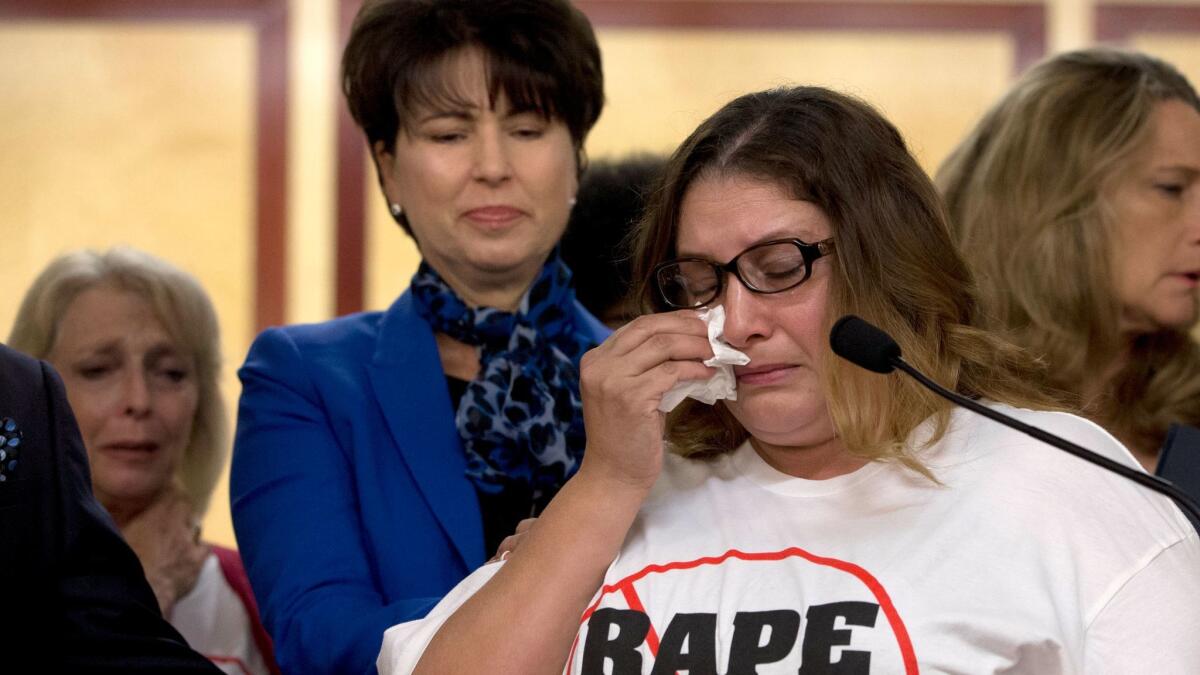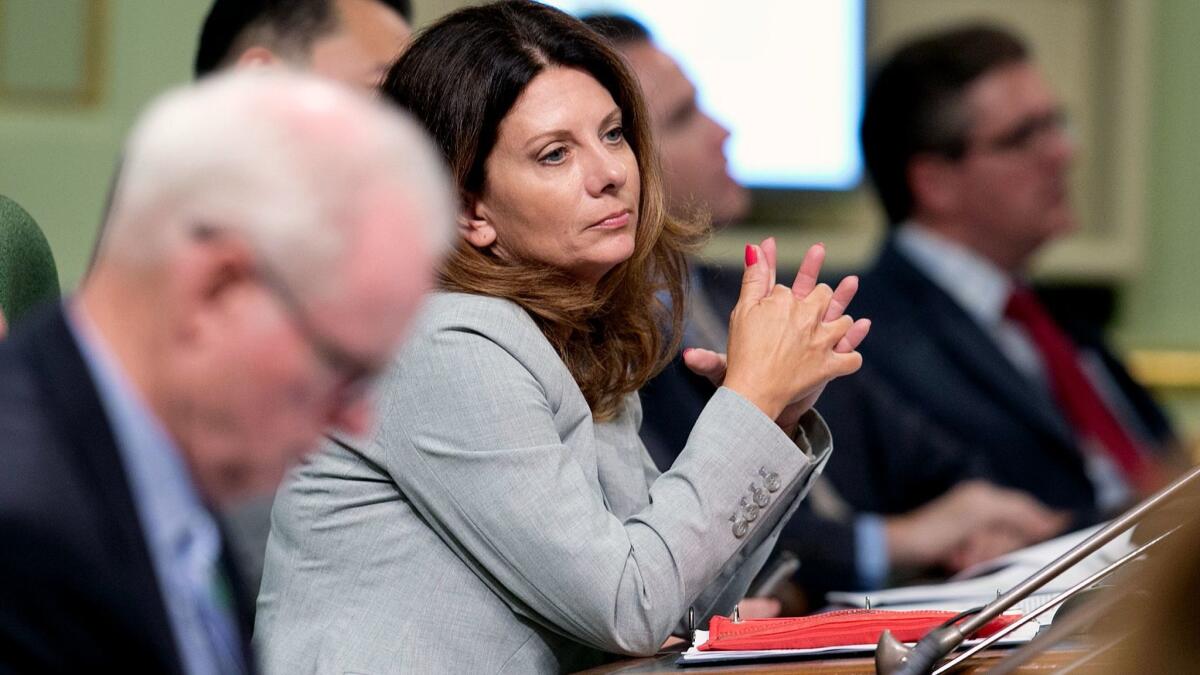California lawmakers have fought sexual misconduct on military bases, farms and college campuses. Will they police their own house?

- Share via
Reporting from Sacramento — Over the past decade, California lawmakers have worked to help curb sexual violence in the workplace and other spheres of public life. They have pushed college campuses to keep better track of incident reports, created whistleblower protections for military officers who file claims and established sexual harassment training for farmworkers and janitors.
Now, as more than 140 women have come forward in an open letter to denounce a “pervasive” culture of sexual harassment in the California Legislature, activists and employment lawyers say lawmakers have not held colleagues and staffers to the same standards demanded of those in other fields.
“Members [of the state Assembly and Senate] are quick at pointing the finger at other folks,” said Fiona Ma, a former Democratic assemblywoman from San Francisco who is now running for state treasurer. “But they don’t want to look inside and fix their own house, air their own dark, dirty laundry.”
In Sacramento, Washington and statehouses across the country, the allegations against Hollywood producer Harvey Weinstein and the #MeToo social media movement have set off a growing conversation about sexual harassment in the political world.
Last month, Assemblyman Raul Bocanegra (D-Pacoima) became the first California lawmaker to resign following sexual assault allegations made against him. Assemblyman Matt Dababneh (D-Woodland Hills) said Friday he will step down at the end of the year, after being accused of forcing a lobbyist into a Las Vegas bathroom, where he allegedly masturbated in front of her. Another legislator, Sen. Tony Mendoza (D-Artesia), has been stripped of key leadership posts after allegations of inappropriate contact with women who worked in his Capitol office.
Now leaders have started to review how the two chambers track and investigate complaints. The state Assembly and Senate are subject to state and federal laws that require employers to establish procedures to prevent sexual harassment, and that hold them liable when failing to do so.
Senate ethics policies were updated in 2014 following political corruption scandals, with changes including the designation of an ombudsman and a telephone hotline for public complaints. In the Assembly, policies state an employee can report sexual misconduct verbally or in writing to his or her supervisor, and administrative officers then decide whether to escalate the complaint to an investigation by referring it to internal human resources staff or outside counsel.
But testimony at a hearing last month revealed the chamber did not keep track of sexual harassment complaints. Witnesses told lawmakers that they often did not know where or how to report misconduct — each house has its own investigative officers and processes, and some in the Capitol are excluded from training, such as interns or fellows.
Lawmakers raised concerns that investigative procedures were not independent enough. Activists and lawyers said that though each legislative house might have policies on paper, they are unevenly applied and can spare elected officials and senior staffers of consequences.
Both chambers have disclosed little data on their investigations.
Genie Harrison, an employment and victim’s rights attorney, said at the hearing that such “systematic failures are what lead to systematic victimization.”
The state Assembly last revised its sexual harassment policies in 2007. In the time since then, California lawmakers have spent the past decade calling for college campuses, military bases and other institutions to train victims on their rights and ensure investigative processes are transparent, independent and clear to all who might need them.
According to a Los Angeles Times review of legislation introduced since 2007, state lawmakers have passed at least 52 bills to extend protections for sexual harassment and assault victims, to toughen punishment for sexual assault and to improve sexual misconduct policies, training and investigation in other industries.
All but 11 have been signed into law. Nearly all moved through both chambers with full or overwhelming bipartisan support — many with “yes” votes from the three lawmakers accused of sexual misconduct. Bocanegra and Mendoza voted in favor of at least 20 of the bills while in office, Dababneh supported more than 30.
The three lawmakers did not vote against any of those proposals.
On the floor and in committee hearings, state lawmakers often took strong stances to protect workers and students, many of them women. Just last year, debate in Sacramento centered on the need to end a national culture that they said trivializes sexual assault and shames victims, as women shared their stories of abuse at the hands of comedian Bill Cosby, and the emotional words of a young rape victim in a letter to her attacker, Brock Turner, resonated across the country.
In response, state lawmakers eliminated the 40-year time limits to bring forth rape cases and toughened punishment for sexual assault.
This year, state Sen. Bill Monning (D-Carmel) urged lawmakers to approve a bill that requires farm contractors to provide sexual harassment training as part of the licensing process, calling California fields “one of the last bastions of inadequate protection.”
“Change in law, making stronger enforcement will not eradicate the problem,” Monning said at a July hearing. “But it will move us a step closer to hopefully empowering — particularly — women in the workplace to know what their rights are, to have a phone number that they can contact.”
He says lawmakers now need to work on helping victims at the Capitol, too. “We need to fight for zero tolerance in every workplace — including the Legislature,” he said.
Other legislation has resulted from the national discourse in recent years over sexual assault on college campuses.
At a Senate education committee hearing in April, Sen. Hannah-Beth Jackson (D-Santa Barbara) and Senate President Pro Tem Kevin De León (D-Los Angeles) urged lawmakers to preserve federal guidelines, which have since been rolled back by the Trump administration, for how universities investigate sexual assault — what Jackson described as “an epidemic” that state lawmakers have long worked to address.
At least two laws require post-secondary schools and community colleges to post their sexual harassment policies in a prominent location on their websites. There are no similar standards for the Legislature, and neither house’s website offers public information on sexual harassment.
In 2014, De León carried the “yes means yes” law, mandating California universities to enact sexual assault policies requiring students to receive “affirmative, conscious, and voluntary agreement to engage in sexual activity,” in order to receive public funding for student financial aid.
As he runs for the U.S. Senate, De León faces questions over the Senate’s handling of sexual harassment claims and the shelving of a whistleblower protection bill for employees of the Legislature.
In a statement in November, he said the Senate endorsed the “reform objectives of the Legislative Women’s Caucus.”
“I believe we must create a two-house process and that we should immediately pass reforms when the Legislature is next in session, including a bill to protect legislative employees from retaliation,” he said.

Assemblywomen Eloise Gomez Reyes (D-San Bernardino), Laura Friedman (D-Glendale) and Marie Waldron (R-Escondido), who are leading a discussion on the issue in the the Assembly, plan to introduce another bill next month that would give both public and private employees more time to come forward with a sexual harassment claim.
Assemblywoman Lorena Gonzalez Fletcher (D-San Diego) said she has been shocked by the stories surfacing against her own colleagues and would no longer leave her 21-year-old daughter unsupervised at the Capitol until the problems are fixed.
“The fact is that these are issues the Legislature has not fully addressed,” Gonzalez Fletcher said. “We haven’t done enough outside, and we haven’t done enough inside.”
Jean Hyams, president of the California Employment Lawyers Assn., said holding employers and bosses accountable moving forward will be key if the current cultural moment is to have a lasting impact.
“Sexual harassment is not about sex, it’s about power,” she said. “Only the exercise of power will stop it.”
California Assembly hearing on sexual harassment policies leaves unanswered questions »
ALSO:
California Assembly hearing on sexual harassment policies leaves unanswered questions
Victims denounce a failing system for reporting sexual harassment at the California Capitol
Sexual harassment hearings come as California Capitol is roiled by accusations and a resignation
California assemblyman accused of forcing lobbyist into bathroom and masturbating
Updates on California politics
More to Read
Get the L.A. Times Politics newsletter
Deeply reported insights into legislation, politics and policy from Sacramento, Washington and beyond. In your inbox twice per week.
You may occasionally receive promotional content from the Los Angeles Times.











